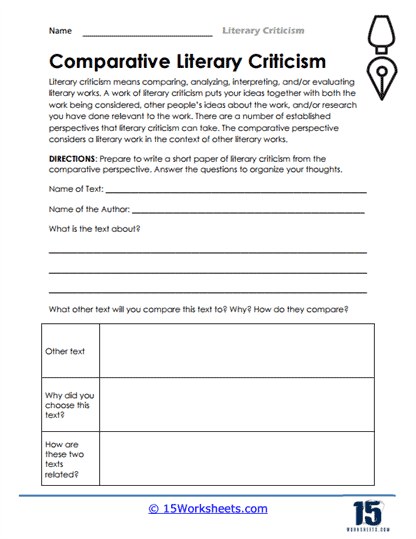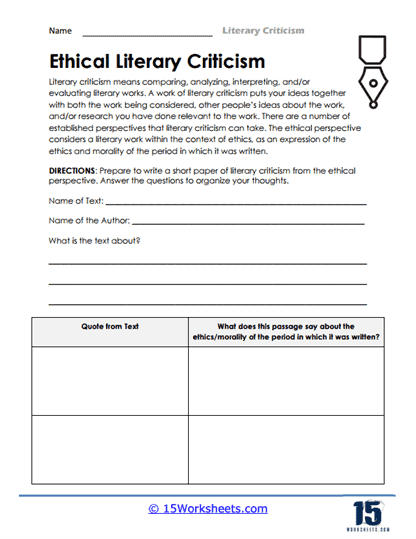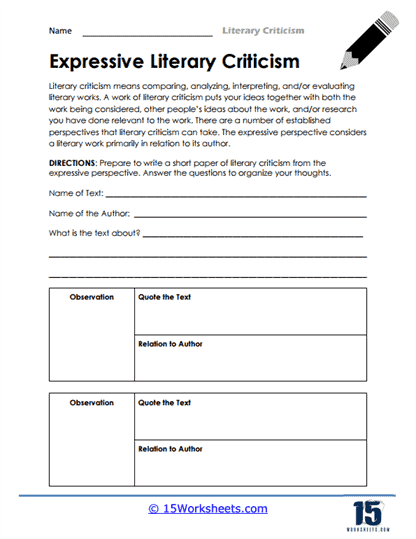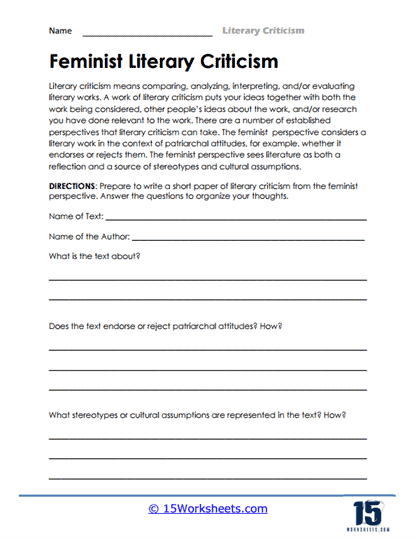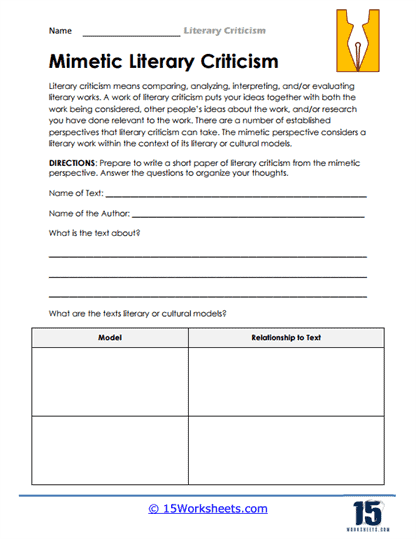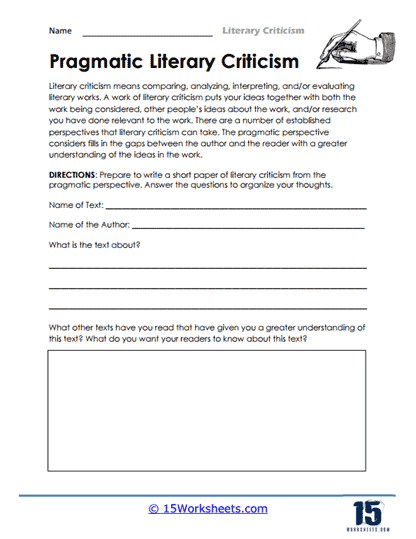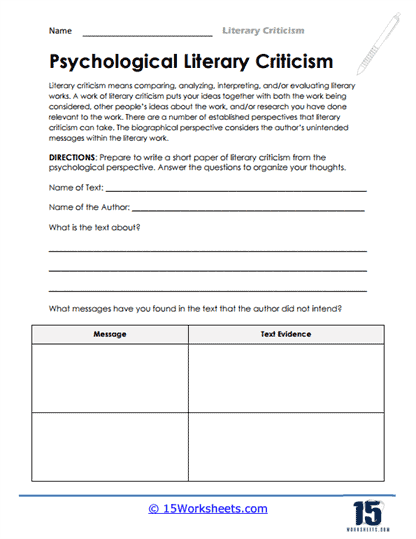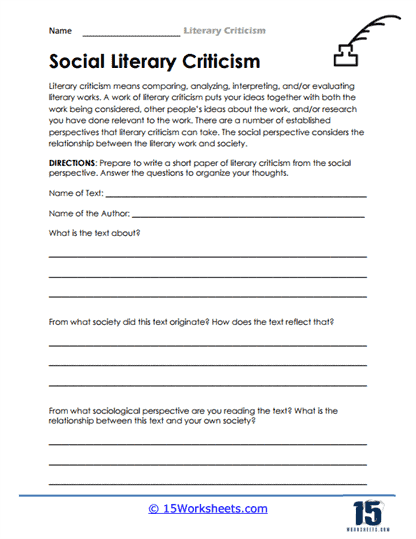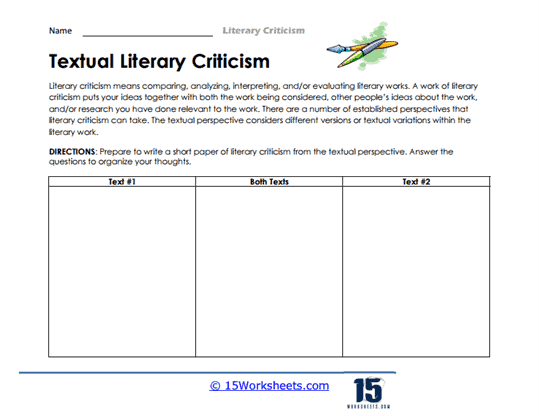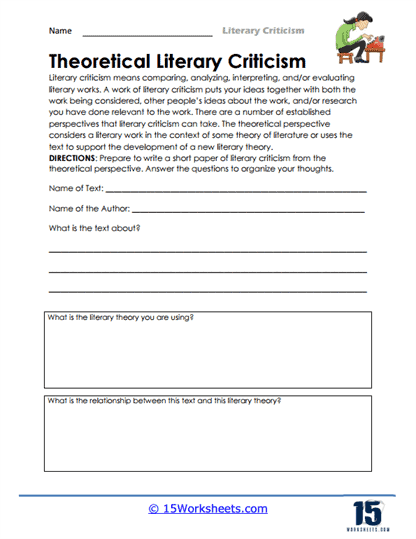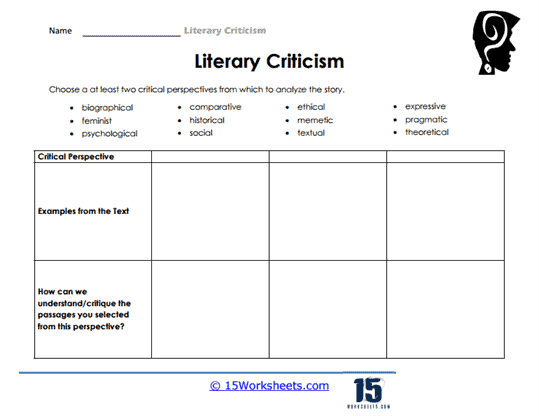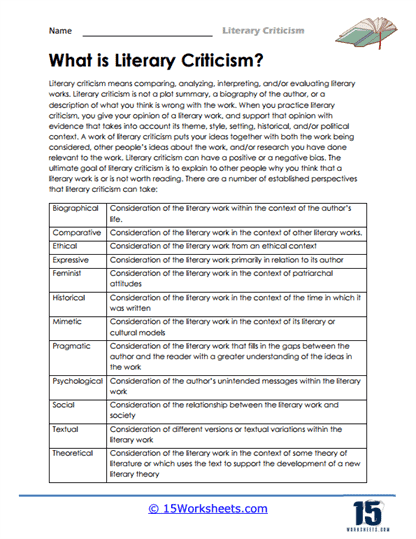Literary Criticism Worksheets
All About These 15 Worksheets
Embark on an enlightening journey into the realm of literary analysis with our meticulously curated collection of 15 dynamic worksheets focused on “Literary Criticism.”
Designed to foster a deeper appreciation for literature and cultivate critical thinking skills, this collection empowers students to explore various lenses through which texts can be interpreted and understood.
Ignite your students’ passion for literature while honing their analytical prowess with our “Literary Criticism” worksheet collection. Whether they’re budding literary scholars, aspiring writers, or simply curious minds, these worksheets provide an engaging and effective means to explore the myriad ways in which literature can be interpreted.
Your students will emerge with a profound understanding of literary dynamics and an enriched set of skills that extend into various facets of critical thinking, cultural awareness, and academic excellence.
What is Literary Criticism?
The objective examination of literary works and topics is known as literary criticism. It is a term that refers to any debate about literature, whether or not specific works are discussed. Plato’s warnings in his Republic on the dangers of poetic inspiration are typically regarded as the first significant example of literary criticism.
The phrase “practical critique” refers exclusively to the interpretation of the meaning and the assessment of quality. Not only may criticism in this limited sense be distinct from aesthetics (the idea of artistic worth), but it can also be distinguished from other issues that may interest a literature student.
The Function of Literary Criticism
Literary criticism serves a wide range of purposes, from book reviews to systematic theoretical debates . Though reviews can influence whether a book is widely distributed, many works thrive financially despite unfavorable reviews, and many legendary works, such as Herman Melville’s Moby Dick (1851), have found an adoring audience long after being critically panned. One of criticism’s main duties is to articulate the modifications in sensibility that allow for such revaluations.
Unknown manuscripts are unearthed, authenticated, and edited by literary critics in the position of scholarly detective. Thus, even rarefied intellectual talents may be used for the most basic function of criticism: bringing literary works to the notice of the public. The wide range of publications in which criticism emerges reflects the diversity of its purposes. In the daily press, criticism seldom demonstrates continuous acts of analysis and may occasionally amount to little more than a summary of a publisher’s assertions for a book’s interest.
Even when it serves its purpose successfully, criticism may enrage authors. When told that their works have unintended meaning, are imitative, or are unfinished, authors who believe literature does not require advocates or investigators are less than thankful.
What such authors may overlook is that once published, their works solely belong to them in a legal sense. The public, not the critic, is the ultimate owner of their works, and it will adapt them for its own purposes. The critic’s duty is to the public, not the author’s self-esteem, and to their own standards of judgment , which are generally higher than the public’s.
Although some critics feel that literature should be addressed in isolation from other topics, criticism frequently appears to be entangled in social and political debates, either explicitly or surreptitiously.
Why Does Literary Criticism Matter?
We’ve all taken at least one English lesson at some point in our lives. Perhaps we’ve been asked to evaluate Shakespeare, Faulkner, or Poe’s writings. Regardless of whether we are reading a tragedy or a comedy, one of the most important skills we learn in English lessons is how to read and debate literature.
Books and poetry assist in broadening our imaginations, whereas tales allow us to go to different realms. We get to see how other people live by learning how to dissect literature through class discussions or reading. Literary criticism allows us to go deeper into a text and comprehend it from different perspectives. Frequently, these viewpoints are not e shared.
These viewpoints are sometimes not easily noticeable unless we go further into the work and learn to see beyond the surface.
There are several approaches to evaluating literature. Some reviewers are interested in knowing when and where an author was born, while others are uninterested. A few diverse methods of literary criticism are listed below.
Literary criticism lays out rules for studying, interpreting, and judging literary works. Explore the definition and different types of literary criticism, the importance of literary criticism, and some instances of different types of literary criticism. Examine conventional critics’, sociological critics,’ Marxist critics,’ New criticism’s, and reader-response criticism’s distinguishing traits.



